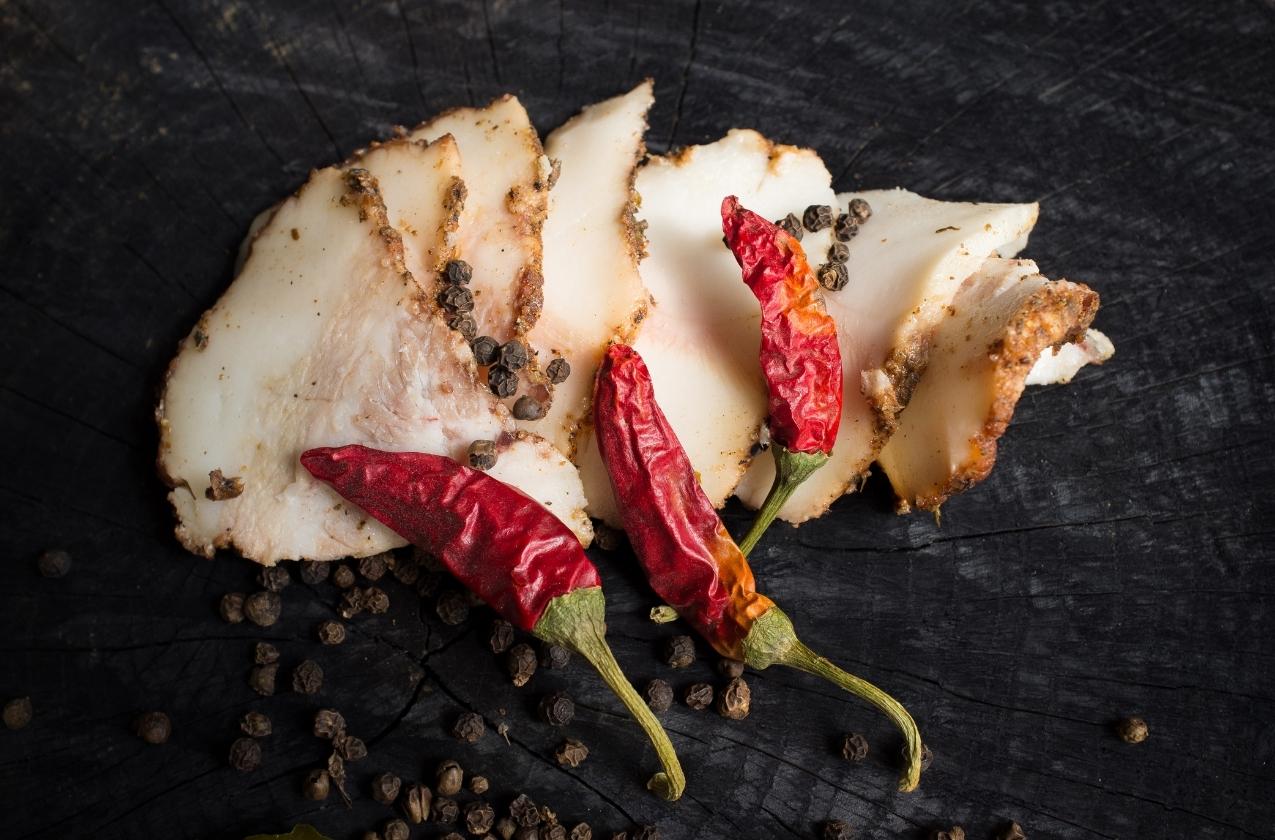There are indeed many myths around salo. Many consider it as a unique Ukrainian product, although the technologies for salting bacon in special marble baths have existed in Italy for many centuries. And the main myth is that this is supposedly just banal unhealthy fat, from which there is no health benefit.
In Ukraine pork is one of the most popular meat products. The pork is used for cooking many varied dishes and of course is the source for the famous Ukrainian salo (white pork fat), which is the symbol of the national cuisine of Ukraine and one of the most favourite and widespread products among Ukrainians.
Initially, salo was a product of the poor, meat and bones were expensive, and the rich considered salo to be garbage. Having learned to preserve it, salt it and thus store it for a long time, the population used salo as a source of fat, which helped to survive the cold weather and hunger.
The lard was used in huge quantities, and candles were made from it, albeit not very bright, but still an additional source of light. With this light, the monks rewrote their books and thanks to this, these manuscript works have survived to this day.
Salo is translated from the Old Slavonic "sadlo", which means "planted on meat." Gradually the sound D dropped out and the word remained, pronounced like "salo".
Salo is one of the most popular snacks in Ukraine. Sliced thin, salo has a butter-like texture and creamy-white hue. It’s often eaten with a slice of rye bread and copious amounts of black pepper, paprika, or garlic to counter its rich fattiness. A side of pickles or onion provides some welcome crunch. Before putting it on the table, it is kept in the freezer. The idea is that you drink a shot of vodka (horilka) and quickly eat a bite of salty salo. The dish is not recommended for those watching their waistlines.
It can be served raw salted or smoked. It can be cooked as cracklings that are eaten with bread, potato or added as pie fillings. Such dishes as meat with potato stew, rissoles larded with garlic, baked ham stewed with cabbage, pork or beef rolls with various stuffings can’t go without salo. It is also used to lard the meat and make it more juicy.

The uniqueness of pork salo lies in the fact that it can’t be oversalted. No matter how much salt you’ll put on a piece of salo, it’ll take as much as it needs, no more and no less. It can then be stored in the fridge for months or in the freezer for even longer.
You can find salo everywhere in Ukraine, and it is common in Ukrainian grocery stores with meat counters abroad. In the Ukrainian folklore salo is one of the main characters of jokes and anecdotes. Festivals and fairs specialised on pork fat are held yearly.
Good lard literally melts in your mouth, envelops with a rich aroma of spices or smells pleasantly sweetish notes. If you try to pierce it with a toothpick, it will go in easily, which will indicate the freshness of the product.
Before buying salo, you should always pay attention to its colour. Fresh salo is pale pink or white. And if the delicacy has a grayish or yellow tint, it is better to leave it in the store: this is old lard.
The most delicious salo is from pigs fed with potatoes, beets, carrots, cereals, soups and other "scraps" from the master's table and sometimes using acorns as a dessert. But pigs raised on farms, with the use of all kinds of additives and growth stimulants, give salo with a chemical aftertaste that no culinary tricks and tricks are able to "kill".

Myth 1: Getting fatter from the salo
You're getting fat not from salo, but from its amount! If you are a normal sedentary or so, you should be given 10-30 grams of lard per day. If you are already obese and are prescribed a low-calorie diet - no more than 10 g per day. The healthiest salo is simply salted, with garlic or pepper. Good and smoked, but only "homemade", with a smoke. At meat processing plants, salo, brisket and other pork delights are smoked in liquid, and this is not comme il faut, the properties of the product do not change for the better.
Myth 2: Salo is a heavy food
Not certainly in that way. In a healthy person with a normal stomach, real salo is very well absorbed and does not overload the liver. In general, the most valuable fats for us are those that melt at our body temperature, i.e. about 37.0. They are digested and absorbed more completely and faster than others. Their list is headed by salo.
Myth 3: Salo is complete grease
And that's great! Because it is an excellent structure - subcutaneous fat, in which cells and biologically active substances are preserved. For example, the most valuable of the fatty acids is polyunsaturated arachidonic acid. It is very rare, in vegetable oils it is absent at all.
You can't live without it. Arachidonic acid is a part of all cell membranes and is needed by the heart muscle. In addition, hormones, immune reactions and cholesterol metabolism cannot do without it. Do not forget about fat-soluble vitamins A (there is up to 1.5 mg per 100 g), D, E, as well as carotene. As a result, the biological activity of salo is 5 times higher than that of oil. So in winter "pork product" is just what is needed to maintain vitality and immunity.
Myth 4: Salo is horrible cholesterol
Yes, it is present here, but even less than in cow oil. And there is nothing wrong with it. Do you think it will immediately begin to be deposited on the arteries and atherosclerosis will begin? Nothing like this! Doctors have long established that the amount of cholesterol in blood and tissues depends little on how much you eat. This substance is perfectly synthesized even if you do not eat it at all.
Myth 5: Fried salo is dangerous
Yes, when frying, salo loses some of its beneficial properties and acquires toxins and carcinogens. But vegetable oils do not behave any better. It is necessary to heat them for a while, as they suddenly cease to be absorbed. But the warmed salo, on the contrary, is absorbed better than in cold or hot-fried. So the way out is simple: the bacon should not be fried to the state of cracklings, but heated over low heat.
Myth 6: Just without bread
Salo with bread is exactly what you need! Of course, this does not mean pampushki buns, but grain bread, made from coarse flour or with the addition of bran. Of course, this is for healthy people without obesity and digestive problems.
When losing weight, do not forget the salo too: it is an excellent source of energy. The dietary option is to eat lard with vegetables, for example, with cabbage. You can take a bite, or you can make a hodgepodge with it, just don't overcook it.
Myth 7: Better with vodka
But that's truth - salo is a wonderful companion to alcohol. Mainly because it doesn't get you drunk quickly. Fatty salo envelops the stomach and does not allow the drink with degrees to be instantly absorbed there. Of course, alcohol will still be absorbed, but only later, in the intestines, and gradually. Alcohol, on the other hand, helps to quickly digest fat and break it down into components.
Salo should be eaten in moderation, recalling Hippocrates, who said that all the poison and all the medicine is the only difference in the dose. Enjoy!




















